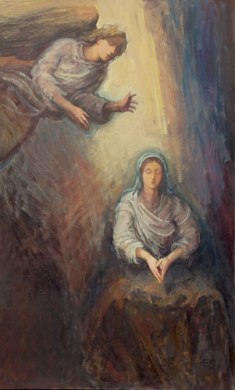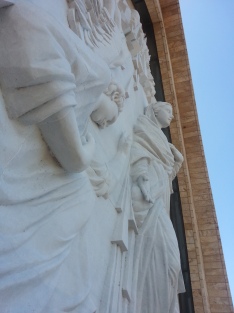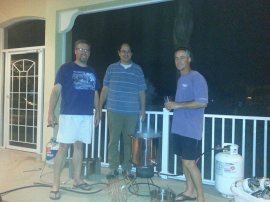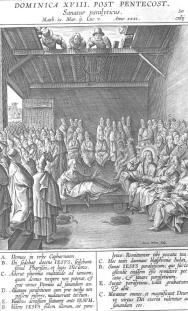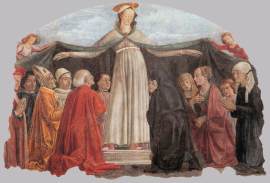Ave Maria Living.com
Ave Maria, Florida – the town with a Catholic heart.©™ Stories & information for residents & visitors.Archive for Father Robert McTeigue SJ
McTeigue: The Annunciation is our icon of what our lives should look like
When was the Culture of Life first proclaimed against the culture of death? It could be said that the Culture of Life began with John Paul’s encyclical, “Evangelium Vitae,” promulgated in 1995. It could also be said that the Culture of Life began in 1973, in response to the Supreme Court ruling on Roe vs. Wade. It might even be said that the Culture of Life was inaugurated by Pope Paul VI in 1968, with his encyclical “Humanae Vitae.” You could make a good case for any one of those claims.
Here’s an easier question: When was Ave Maria University founded? Well, depending upon how one counts such things, we can say that Ave Maria University is looking forward to soon celebrating its twelfth anniversary. That is true, but it is not quite correct.
I think that Ave Maria University, and the Culture of Life which it serves, were both inaugurated at the Annunciation, the great solemnity we are celebrating today. At that moment, when the Providence of God met the humility of Mary, human life was given an identity, a dignity and a destiny that the pagans of the ancient world could not have imagined, and which the modern world cannot match or even comprehend. In that moment, in the “fiat,” in the “yes” with which Mary responded to the Archangel Gabriel, the horrifying power of sin and the culture of death it spawned, began to be broken.
Consider this lovely image from Saint Irenaeus. He wrote: “Eve, by her disobedience, tied the knot of disgrace for the human race; whereas Mary, by her obedience, undid it“. Our Blessed Mother, by her love, trust and obedience, cooperated with God so that within her very body, the seed of the Culture of Life took root.
We here at Ave Maria, love and serve the Culture of Life begun at the Annunciation; we here at Ave Maria, in opposition to the culture of death which is devouring both human bodies and human souls, wish to imitate the love, trust and obedience of Mary. In imitation of our Blessed Mother, we too wish to cooperate with the saving plan of God. We want to say “yes” to what God would do with us, body and soul. That is why this glorious Solemnity of the Annunciation, a cause of joy for all Catholics, is held especially dear to us here at Ave Maria. The Annunciation is for us here at Ave Maria our icon, our charter and our measure.
The Annunciation is our icon, for it helps us to see what our lives should look like—a humble, grateful and fruitful trusting of God’s Power and Providence. The Annunciation is our charter, for Mary’s “fiat”, her “yes” to the work of God must be echoed and implemented by us here. And the Annunciation is our measure, for we can only judge our success or failure by our obedience to the call of God.
Today, on the Solemnity of the Annunciation, the patronal feast of Ave Maria University, let’s pray for three graces, three special blessings. Let’s pray to be alert—alert to the promptings of the divine messengers sent our way, as Mary was. Let’s pray to be obedient—obedient to the workings of Divine Providence, as Mary was. And let’s pray to be fruitful—fruitful stewards of the amazing grace entrusted to our care. If we do that, if we pray and live to be alert, obedient and fruitful, then we can both echo and imitate Mary at the inauguration of the Culture of Life and say, “May it be done to me according to your word.”
Ave Maria University’s Father Robert McTeigue, S.J., preached this homily during Mass for the Solemnity of the Feast of the Annunciation, which is the patronal feast of the town of Ave Maria, the parish of Ave Maria Oratory, and Ave Maria University. Father McTeigue is currently finishing a collection of homilies and essays on preaching entitled, I Have Someone to Tell You: A Jesuit Heralds the Gospel. He recently began writing a weekly column. Father McTeigue earnestly seeks your prayers that his life and work be to God’s greater glory.
Comments off
McTeigue: We are called to a conflict that is at once constant, universal, and inevitable
Do you want to hear a story? In the early 20th century, a group of Anglican missionaries decided that they would imitate Jonah, and call towns and villages to conversion. They decided to go to rural China to carry out their plan. They went from place to place, standing in the center of gatherings of people. They attracted a lot of attention, because, in rural China in the early twentieth century, these missionaries of the Church of England were clearly rare, foreign, and exotic. Then they would read John 3:16 out loud and ask if anyone wanted to be baptized. They never got any takers. The missionaries would leave, disheartened, wondering why Jonah was able to call the entire city of Nineveh to conversion, and they could not get one single convert.
These well-intentioned missionaries overlooked one factor. The Chinese people they met in China spoke Chinese; the missionaries were announcing the gospel in English. They were announcing something that no one but they themselves could understand, and act upon.
That story got me to thinking about understanding and hearing. I’ve seen parents stand at the edge of a playground that’s occupied by dozens of screaming kids, and they can pick out the voice of their own child and filter out the words and yells of all the other kids. I don’t know how that works.
Comments off
McTeigue: Goals, resources and allies in the battle to restore the male soul (all present in Ave Maria)
In his latest column, Father Robert McTeigue “identif[ies] assets both spiritual and natural that we can bring to bear in this great struggle for men.” Father sent AveMariaLiving.com a note requesting that we link readers to it because in it he favorably mentions the town of Ave Maria, Florida. This is the second of three columns in which McTeigue addresses the cultural and spiritual battle for the male soul. The first column described “some of the academic, legal, social, cultural and economic forces arrayed against men as men, and pointed to [the battle’s] spiritual root.” In the upcoming third column he will “describe a concrete plan of life for the cultivation of authentic masculinity, addressing a man’s role as pilgrim, warrior and king.” The fourth column will discuss distinctively Christian friendship among men.
UPDATE:
1st column in this series: Modern culture has declared war on masculinity.
2nd column in this series: Goals, resources and allies in the battle to restore the male soul.
3rd column in this series: Male role models from Scripture, not GQ.
4th column in this series: Distinctively Christian friendship among men.
Comments off
McTeigue: Rejoice because “You are worth my Son”
Well, we have a problem. In our liturgical calendar, this Sunday is known as “Gaudete Sunday”, which may be very loosely translated as “Rejoicing Sunday.” In my copy of the Roman Catholic Daily Missal, I read that, “On this day the Church urges us to gladness in the middle of this time of expectation and penance.”
Now, those who know me can tell you that I am not prone to spontaneous outbursts of rejoicing and gladness, and achieving rejoicing and gladness on a schedule, even a liturgical one, would take a significant act of the will on my part. And while I do frequently experience expectation, what I most often expect is best not spoken of in the presence of impressionable young children such as we have here among us this morning.
Now, in fairness, I must say that I think that I and those like me—we have earned our gloom. Some among the chronically gloomy would say that they have earned their gloom by making the effort to keep abreast of what’s going on in politics near and far. Some such folks have concluded that the rule of law is in tatters in this country and beyond whatever borders may still be said to remain. They remind us that the veneer of law that covers underlying lawlessness, sooner or later, inevitably fades away. Lawlessness, as both history and headlines teach us—for those who care to learn—they teach us that lawlessness and the tyranny that precedes it do not protect the vulnerable, promote the common good, or secure the rights of the Church.
Other folks say that they have earned their gloom as they observe the present state of the Church’s life. These folks call “apostasy” what one prominent Catholic described as “miscues” during the recently-concluded Extraordinary Synod on the Family. These same folks also use the word “persecution” as they look at those circling the Church around the world and closer to home. Beheadings abroad and local legislation show that nowadays those with access to either to power or force tend to have no love for Holy Mother Church.
So, for those who are more inclined to count clouds during the day rather than count stars at night, Gaudete Sunday seems a bit…incongruous.
Nonetheless, duty calls. Saint Paul exhorts us with these words: “Rejoice in the Lord always: again, I say, rejoice!” Saint Paul is right, and whatever dark, brooding, Irish melancholics you may know, and those like him, are wrong. Let me explain why.
Comments off
McTeigue: Do we think of Ave Maria as the Hobbits thought of the Shire?

“Consider, as you watch the movie, whether we think of Ave Maria as the Hobbits thought of their hometown of the Shire.”
What do you think of when I say the words, “Oil Well Road”? Well, if you have spent any time here in Ave Maria, you know that Oil Well Road is the link to the city of Naples and to the great world beyond. If you have been around for more than just a few couple of years, you probably know that Oil Well Road has been expanded by a massive construction project. And you know that the project of widening, straightening and leveling Oil Well Road took a lot of time, effort and money.
I mention the construction project at Oil Well Road because of what we read about John the Baptist in Mark’s gospel this afternoon. Borrowing from the prophet Isaiah, the Baptist calls upon his hearers to, “Prepare the way of the Lord, make straight his paths.” Well, gosh—how hard can that be? I mean, if the Lord wants to go somewhere, it should not be difficult for Him to get the roads He wants. I mean, He is God, after all….He just needs to snap His fingers and “POOF!” Instant 12-lane superhighway! Right? Well…no….
The way of the Lord that John the Baptist spoke of, the way of the Lord Who is coming into the world, is the way into our hearts. And that road is a mess. About the human heart the prophet Jeremiah said, “More tortuous than anything is the human heart, beyond remedy; who can understand it?” To which I would add, “Amen!” We know he is right. The road into our hearts is crooked, with plenty of detours, dead ends, littered with the debris of idols and cratered by sin.
But the reason that the season of Advent is a season of hope is because the Church proclaims that our Lord will walk into our hearts if the way is prepared for Him. Yes, yes, I know—easier said than done. I am reminded now of a friend whose little boy spilled grape juice on a white carpet. As his mother gasped in horror, he said, “Don’t worry Mommy! I’ll just magic it away!” We cannot have recourse to magic or to wishful thinking to make straight the way of the Lord into our hearts. So, how shall it be done? How about by prayer? The short answer to that question is, “Yes and No.”
The answer is “No” if we think that prayer will allow us to “magic away” what separates us from God. For example, if I think that all I need to do is to say my prayers and then, presto-change-o, abracadabra, hocus-pocus, all my attachments to sin will simply disappear, and then the Lord can just sprint into my heart and there begin His reign, then the answer is surely “No.” Prayer does not work that way. We all know that. And we all know that because we have all tried it.
So, I will ask again: Can we prepare the way of the Lord by prayer? The answer is surely, “Yes,” if we understand prayer properly. We must understand that prayer is the fuel for the engine of our discipleship, which means that prayer is the power behind apostolic action. Filling up the tank and then leaving the car in the garage gets us nowhere.
Prayer gives disciples the fuel needed to begin the necessary and hard work of reforming our lives. Prayer gives us the desire and energy we need to remove the obstacles of sin that keep our Lord from entering our hearts and from exercising His authority over our lives. To make straight the way of the Lord is a project that requires prayer, and then reform, which is a clearing away of whatever impedes to progress of God into our lives.
Today, I will mention just one impediment, one great obstacle that keeps God from realizing His reign over our lives. That obstacle is the illusion, the subtle and persistent illusion that we believe we ought to be allowed to take for granted, because we have deserve it, an ordinary life of routine, comfort and plenty.
Next week, the third movie installment of Tolkien’s great novel, “The Hobbit” will be in the theaters. I am sure that many folks here will see the movie; I will probably see it myself. While you are watching that movie, I would like you to
Comments off
McTeigue: John Paul the Great and the Gospel of the Family
Sometimes, a homilist feels like a DJ at a wedding reception. He always knows that some people will leave disappointed because they didn’t hear what they were hoping to hear that day.
Today’s feast day is in honor of Saint John Paul 2, and so one might reasonably expect a homily that waxes eloquent in praise of that great saint.
We have just marked the end of the Extraordinary Synod on the Family, of which John Paul should have been the patron. That synod did not leave the Church in a state of serene clarity, and so one might reasonably expect a homily that applies the wisdom of John Paul to the synod.
And today we have a disturbing passage from the Gospel of Luke, wherein Jesus describes the blessings of faithful servants and the doom of unfaithful servants. We tell ourselves we are one and fear that we are the other, and so one might reasonably expect a homily that helps us to take this painful parable to heart.
But why should we settle for reasonable expectations? Let’s try to do it all in the short time that God has given us!
The parable we heard today warns us that we do not know the day or the hour when our Lord might return to us in His glory, or when death might carry us off to Him. We would do well to be ready for either event. But that observation is as facile as it is banal, and by itself, it isn’t likely to do us much good.
The parable reminds us, and John Paul would surely agree, that the Lord comes to us day by day, moment by moment, in Word and Sacrament, in our neighbor, and in mundane events. Are we ready to greet our Lord hidden within the ordinary and the familiar? Do we see ourselves as serving our Lord’s hunger as we prepare yet another meal? Do we see ourselves as honoring our Lord’s wisdom as we write another essay? Do we see ourselves as reverencing our Lord’s innocence as we dry a child’s tears? These familiar acts, John Paul would tell us are truly familiar—that is, they are the acts of family. The family is an altar upon which are placed loving acts of praise, sacrifice and care—sometimes dramatically, sometimes quietly, and, please God, always with great love, regardless the cost.
The Synod on the Family would agree that the families entrusted to our care deserve, as their birthright,  “faithful and prudent” stewards. It is right, then, as disciples of Christ, to have an examination of conscience regarding our stewardship of the families entrusted to our care. Our Lord Himself resides in each member of our family, and we would do well to attend to His needs and the gifts He brings.
“faithful and prudent” stewards. It is right, then, as disciples of Christ, to have an examination of conscience regarding our stewardship of the families entrusted to our care. Our Lord Himself resides in each member of our family, and we would do well to attend to His needs and the gifts He brings.
I fear that we often misunderstand these words of Our Blessed Lord: “Much will be required of the person entrusted with much, and still more will be demanded of the person entrusted with more.” Many seem to think that what Jesus means is this: “Well, if you’ve been given lot of resources and blessings, expect a lot of accountability. And if you’ve been given a whole lot of resources and blessings, expect a whole lot of accountability.” If that were a correct interpretation, one would almost be inclined not to be very blessed.
I think that’s a misunderstanding of the gospel. I think Jesus is saying this: “Look, if you’ve been entrusted with responsibilities, expect to give an account before God of your stewardship. And if you’ve been entrusted with responsibility for creatures made in the image of God and redeemed by my Precious Blood—if you have been entrusted with the care of family—then expect to give an exacting account before God of your stewardship.”
Frightening? Maybe. But it is also wonderful news! God gives not just His love but also gives us those whom He loves! He gives us the vocation of loving as He does—freely, fully, faithfully and fruitfully. God calls us to become like Himself, He Who is Love, and He gives us the family as a great school of love. That’s why the family must be cherished and protected and guarded most vigilantly—because without proper stewardship of family, we will fail, each of us and all of us, at our human vocation to become love by loving as God loves.
Let’s pray today for the intercession of Saint John Paul, that great apostle of the family, to bless the work of the synods and our family life, so that, like him, we may be faithful in love, even unto death. Then with him we can echo the words of the psalmist and say, “God indeed is my savior. I am confident and unafraid.”
May God’s Holy Name be praised now and forever.
Ave Maria’s Father Robert McTeigue, S.J., preached this homily on the feast of Pope Saint John Paul the Great last Wednesday. Father McTeigue is currently finishing a collection of homilies and essays on preaching entitled, I Have Someone to Tell You: A Jesuit Heralds the Gospel. He recently began writing a weekly column, which this week focuses on what he would want the Synod Fathers to know about his long-suffering divorced friend, Pete. Father McTeigue earnestly seeks your prayers that his life and work be to God’s greater glory – and he invites your comments.
Comments off
McTeigue: Christ wants a radically welcoming and inclusive Church
Ave Maria’s Father Robert McTeigue, S.J., preached this homily at Mass last Friday:
We were created for the praise of God’s glory. What is God’s glory? God’s glory is the shining forth of His truth.
In these days, when people tell us that we must be a “welcoming” Church and an inclusive “Church”, I think we must ask, “Can we be the Church that welcomes and includes the truth of God that God Himself has revealed?”
Can we welcome and include the truth of God’s wisdom? The wisdom that made us male and female and for each other as male and female? Can we be such a welcoming and inclusive Church?
Can we welcome and include the truth of God’s goodness? The absolute goodness that cannot abide any evil or lie? Can we be such a welcoming and inclusive Church?
Can we welcome and include the truth of God’s mercy? The mercy that allows us to embrace the justice of God which names good as good and evil as evil? Can we be such a welcoming and inclusive Church?
It is for such as these that we were made, we who were made for the praise of God’s glory. And at this moment, when we are being called upon to welcome and include what dishonors God, that we must decide whom we shall worship? Shall we worship the living God Who has revealed Himself to us through His only-begotten Son, Who is the Way, the Truth and the Life? Or shall we worship an idol of our own making?
If we make our choice well, then we will know the truth of the psalm we heard today: “Exult, you just, in the LORD; praise from the upright is fitting.”
May God’s Holy Name be praised now and forever.
Father McTeigue is currently finishing a collection of homilies and essays on preaching entitled, I Have Someone to Tell You: A Jesuit Heralds the Gospel. He recently began writing a weekly column,  which this week focuses on what he would want the Synod Fathers to know about his long-suffering divorced friend, Pete. Father McTeigue earnestly seeks your prayers that his life and work be to God’s greater glory – and he invites your comments.
which this week focuses on what he would want the Synod Fathers to know about his long-suffering divorced friend, Pete. Father McTeigue earnestly seeks your prayers that his life and work be to God’s greater glory – and he invites your comments.
Comments off
McTeigue: What happens when we lack proper priorities?
Ave Maria’s Father Robert McTeigue, S.J., preached a wonderful homily at Mass this past Sunday. If you’ve been following the synod this week, you will likely want to send this homily to every synod father – yes, it is that good and it touches on the most difficult issues:
Do you want to hear a story? When I was a newly-ordained priest, I was invited to go abroad to attend a conference of Catholic ecumenists. I was told that there I would learn how to enter into dialogue with the world’s religions. The two-week trip to southern Italy appealed to me as well.
At the conference, I learned that there wasn’t going to be much dialogue. In fact, I was told that now it was time for the Church to “learn how to sit in silence at the feet of the world’s religions.” I stood up and pointed out that as a freshly-minted priest in his mid-30s, I was by far the newest and youngest priest in the group. If this venture were to have a future, it may well have to take me along with it. Here is the challenge I posed to them. I said, “Fathers, let us grant, for now, that I will take up your mandate to ‘learn how to sit in silence at the feet of the world’s religions’. But is there any one thing that you want me to say to them before I fall silent? As I go out the door to receive my tutelage from the world’s religions, will any of you jump up and say, ‘Hey! Bob McTeigue! Whatever you do, don’t forget to tell them…’ What would that one thing be, Fathers? What would that one thing be that you insist that I tell the world’s religions before I fall silent before them?” They couldn’t think of anything. I didn’t pay much attention to the proceedings of the conference after that, but I did enjoy having Nutella for breakfast every morning with freshly-baked Italian bread made by real Italians. That was the high point of the conference for me.
I think of that story as I try to bring together our selection from the epistle of Saint Paul and our passage from Matthew’s gospel. Today’s readings have a great deal to teach us about proper priorities and what happens when you lack them. Here’s a hint of what I have in mind: When you don’t have proper priorities, you end up telling newly-ordained priests to sit in silence at the feet of the world’s religions.
…
Click below to read the rest of the homily.
Father McTeigue is currently finishing a collection of homilies and essays on preaching entitled, I Have Someone to Tell You: A Jesuit Heralds the Gospel. He recently began writing a weekly column. He earnestly seeks your prayers that his life and work be to God’s greater glory – and he invites your comments.
Comments off
McTeigue: Are we exempt from the blindness that has ruined other communities?
Ave Maria’s Father Robert McTeigue, S.J., preached a wonderful homily at Mass on the Twenty-seventh Sunday in Ordinary Time:
Do you think that God has a sense of humor? I think that He at least has a sense of irony. After all, He has a city boy like me regularly preach about wheat, seeds, sheep and fish—all things I’ve not spent a lot of time with. And now, I, whose experience in construction does not extend beyond nailing two boards together, have to preach to you about why buildings fall down.
Jesus said, “The stone that the builders rejected has become the cornerstone.” The cornerstone is the first element of a building’s foundation. The rest of the foundation flows from the cornerstone. In other words, if you mess with the cornerstone, the whole building will come crashing down around your ears.
…
We have to sound the alarm. We have to offer alternatives. We have to offer shelter to those who may be fleeing the collapse. And…we have to look in the mirror.
Here in our little home of Ave Maria—in our schools, our town, our parish, our neighborhoods and families, and within our own souls—we have to ask ourselves: “Is Christ the true cornerstone? Are we faithful and fruitful stewards of God’s gifts and God’s favor? Are we exempt from the blindness that has ruined other communities, nations and even civilizations?”
These hard questions have to start within the sanctuary of each soul here. And then with humility and charity we need to begin to have that conversation with one another.
…
Click below to read the entire homily.
Father McTeigue is currently finishing a collection of homilies and essays on preaching entitled, I Have Someone to Tell You: A Jesuit Heralds the Gospel. He recently began writing a weekly column. He earnestly seeks your prayers that his life and work be to God’s greater glory – and he invites your comments.
McTeigue: Why we say “Ave Crux Spes Unica!”
Ave Maria’s Father Robert McTeigue, S.J., preached this homily today for the Feast of the Exaltation of the Cross (the Epistle and Gospel for the Mass came from Philippians 2:5-11 and John 12:31-36):
When you look at the cross, what do you see? Do you see an accessory, or do you see a necessity? I ask this question because it seems to me that much of our culture, in both secular and Christian circles, sees the cross only as an accessory. I say that because it seems to me that very many people, both secular folks and self-identified Christians, seem to be unable to come to terms with intractable evil. What do I mean by that?
I call intractable evil the kind of evil that cannot be reasoned with, that cannot be explained by human motivation alone, and that stubbornly endures even while it seeks to spread. It’s like the mold you get in your basement that you can never quite seem to get rid of. Even after you scrub and repaint, the smell remains, and the mold inevitably comes back.
Many spokesmen for our times, both secular and self-identified Christian alike, seem to suggest…
Comments off
McTeigue: How could you not give yourself completely to a miracle when it is offered to you?

Ave Maria’s Father Robert McTeigue, S.J., preached this homily at today’s Mass:
Do you want to hear a story? When I taught at another university, one that identified itself as “Catholic”, I all too frequently had the following conversation with students.
“Do you practice any particular religion?”
“Well, I’m Catholic…I guess…”
That always struck me as odd. How can one not be sure about whether or not one is a disciple of a crucified God? If you asked someone about his profession, would you expect to hear, “Well, I’m a brain surgeon…I guess…I mean, sometimes I practice brain surgery, but not a lot and not recently, because, well, like…I don’t really get much out of it, but I know that my mother would like me to do it more often…”
My late mentor in philosophy, the great Paul Weiss, was an agnostic Jewish metaphysician…
Comments off
McTeigue reveals St. Ignatius’s cure for blindness

As promised, in the second installment of his new weekly column our very own Father Robert McTeigue, SJ, offers us a cure for blindness. Here is a snippet:
We open our eyes on Sunday morning and we think about getting ready to go to Mass and then we blink and it’s Saturday night and we have no idea about how we spent the intervening days of the week. We are too rushed, too busy, too unobservant—too spiritually blind—to take note of what’s happened to us, in us or through us. As a result, we overlook graces offered, and graces received; we overlook near and actual occasions of sin; patterns of sin and grace may be taking root in us and we don’t know how, where, or why. Who can live like that? We do. Who should live like that? No one. Is there an alternative? Yes—thanks to Saint Ignatius Loyola.
With that, I will ask: “Have you thanked God today for all the priests in Ave Maria?”
Comments off
Pam Stenzel talks about sex at Ave Maria University
Okay. I admit the headline is meant to arrest your attention. Word on the street is that sex is supposed to be amazing and powerful. But too often WHY and HOW it can be amazing and powerful are not addressed. And the dark side of that power is often considered a taboo for discussion.
But not with Pam Stenzel. She has spoken in Ave Maria before to rave reviews – one of her biggest fans is Father Robert McTeigue, SJ.
Pam will speak about sex at the AMU ballroom on Thursday, September 11 at 8:00pm.
Posted from WordPress for Android
Comments off
In new weekly column, Father McTeigue educates Time about women Religious
Last week, Time magazine published an embarrassing and absurd screed about “nuns”.* Today Ave Maria’s beloved Father Robert McTeigue launches his new weekly column in Aleteia.org by explaining why faithful women are choosing Religious life.
* For the record, nuns are contemplatives who stay inside their typically cloistered convent walls, not the professors, social workers or activists the Time author discusses. Whereas Sisters often work outside of their convents.
Comments off
McTeigue: on lust, nursing babies, serving 2 masters, and St. Aloysius Gonzaga’s example of purity

St. Aloysius Gonzaga’s example of caring for plague victims resulted in his being adopted as the patron of those who have AIDS and their caregivers
Ave Maria’s Father Robert McTeigue, S.J., preached this homily on the feast of St. Aloysius Gonzaga. He is currently finishing a collection of homilies and essays on preaching entitled, I Have Someone to Tell You: A Jesuit Heralds the Gospel.
Why should we care about Saint Aloysius Gonzaga, who was a young Jesuit saint who died at the age of 22 in 1591? Well, he’s long been known as a “patron of youth”, which is a fine thing, because your youth today need plenty of patrons, but I suspect some people may find Saint Aloysius difficult to market to today’s youth. After all, he doesn’t have a cool street name like others admired by young folks today, such as “Jay Z” or “Righteous B.” We don’t have photos of him looking like an Italian fashion model, as we do of Blessed Pier Giorgio Frassati. And to make Saint Aloysius a reall hard sell in today’s world, he’s known as a patron of youthful purity.
Comments off
McTeigue: Jesus tells us, “Do not make an idol or an instrument of people made beautiful by God.”
Ave Maria’s Father Robert McTeigue, S.J., preached this homily today for the Feast of St. Anthony of Padua. The scripture readings are here. Please pray for Father as he works towards completing a collection of homilies and essays on preaching entitled, I Have Someone to Tell You: A Jesuit Heralds the Gospel.

Michelangelo’s naked Adam and Eve just before the Fall, on the ceiling of the Sistine Chapel. According to Ave Maria University’s Dr. Michael Waldstein, a renowned scholar on Pope St. John Paul II’s Theology of the Body: “Some [naked] images push us to concupiscence, others do not. . . . Going to the Sistine Chapel and looking at the naked women on the ceiling is for this reason a very different experience than watching a pornographic movie. It is not presumption, but the experience of many men, that one can look with purity at Michelangelo’s nudes and take delight in their beauty. Michelangelo himself must have looked at his naked models in a pure way in order to be able to paint nudes in that pure way. . . . Of course, if one does feel a slide into concupiscence when looking at Michelangelo’s nudes, it is a good idea to look away. That need to look away should also be a trumpet blast for recognizing . . . that one is in need of a serious transformation.”
May I ask you a question? What if someone came to you and said this: “Oh! I just did a terrible thing! I was in an art museum, and I noticed that the paintings were beautiful!” You would think that a rather strange statement, would you not? Suppose your troubled friend went on to say: “And after I noticed that the paintings were beautiful, I praised the artists who painted them!” You would know right away that your friend is obviously quite confused. Going to an art museum, enjoying the beauty of the paintings, and then praising the painters—well, in terms of a purpose of a museum—it just doesn’t get any better than that.
But what if your friend says this: “Oh! I went to the art museum, and I saw the beautiful paintings, and I stole them!” Then you would know that your poor friend is more than just confused. And what if your friend said: “I went to the art museum, slashed the beautiful paintings, and used the shredded paintings to shine my shoes.” Then you would know for sure that your confused friend is very sick.
Now, let me ask you another question. What does this little parable of mine have to do with today’s gospel reading?
Fr. McTeigue: Invite God’s Providence & Accept His Paternal Authority
 Ave Maria’s Father Robert McTeigue, S.J., preached this homily for the 5th Sunday after Easter according to the calendar of the Traditional Latin Mass. The Epistle was James 1:22-27, and the Gospel was John 16:23-30. Please pray for Father as he works towards completing a collection of homilies and essays on preaching entitled, I Have Someone to Tell You: A Jesuit Heralds the Gospel.
Ave Maria’s Father Robert McTeigue, S.J., preached this homily for the 5th Sunday after Easter according to the calendar of the Traditional Latin Mass. The Epistle was James 1:22-27, and the Gospel was John 16:23-30. Please pray for Father as he works towards completing a collection of homilies and essays on preaching entitled, I Have Someone to Tell You: A Jesuit Heralds the Gospel.
Did you ever wonder—what would the world look like if there were no fathers? Now, if you are biologically minded you might object and say, “‘No fathers’ = ‘no babies’” so a world without fathers would not last very long. True enough. But I am not talking about being a simple donor of genetic material; I am talking about being a true father. What would a world without true fathers look like?
Comments off
Father McTeigue: More reparation for Harvard’s black mass

Older & better: Eucharistia est Veritas Christo et Ecclesiae – The Eucharist is the Truth of Christ and the Church
Last Thursday we shared with readers: 1) the evidence presented by Harvard alum Michael Pakaluk (an Ave Maria resident and professor at Ave Maria University) that the leaders of Harvard face a conundrum of their own making when it comes to what shall henceforth be known as Harvard’s black mass; 2) a beautiful rendering of one of Satan’s most powerful enemies, Saint Michael the Archangel, painted by the talented Cornelius Sullivan, a former art instructor at Harvard University who is an Ave Maria parishioner; and 3) the homily AMU’s Father Robert McTeigue, SJ, delivered as he led a public act of reparation and love.
On Friday Father McTeigue delivered another wonderful homily – another public act of reparation and love – joyfully proclaiming the “veritas” the Church has always vouchsafed: that the Eucharist is the Truth of Christ and the Church. He asked me to include his forwarding remarks, which are in italics:
As a priest, I am a servant, steward and guardian of the Eucharist. Consequently, the sacrilege to be hosted at Harvard on Monday is especially painful to me. You know that on Thursday, when I first learned of this outrage, I changed my plans for the Mass I was scheduled for that day, along with the homily I had planned. I offered the Votive Mass of the Precious Blood. On Friday, I was scheduled for the noon Mass here. With the impending Harvard scandal still on my heart, I offered the Votive Mass in Honor of the Holy Eucharist. Here is the homily I preached that day. Again, I must say how grateful I am as a priest to be of service to a community with such a deep reverence and love for our Eucharistic Lord.
When I was a boy, I grew up hearing stories of my Italian grandfather, Guido Formisano. On Sundays, your Sunday obligation was only partly fulfilled by going to Mass. Your obligation was completed by eating Sunday dinner, with Papa at the head of the table. These were great and grand dinners. Papa would be all the leaves into the table in order to extend it. And when they ran out of chairs, they would put ironing boards between stools in order to seat everyone. The homemade food and homemade wine appeared endless. Everyone enjoyed the dinners Papa presided over, but few really knew what those dinners cost him.
Comments off
Ave Maria’s Michael Pakaluk and Fr. McTeigue on Harvard’s black mass

Saint Michael by artist Cornelius Sullivan, a member of the Ave Maria community. Saint Michael’s assistance is invoked against the devil at the end of every Mass in Ave Maria. Sullivan has taught Drawing at the Harvard University Graduate School of Design.
UPDATE 5/12/2014: Father McTeigue offered another act of reparation here.
By now many have heard of Harvard University’s “black mass” scheduled for May 12. The always engaging head of Ave Maria’s Department of Philosphy, Michael Pakaluk, who as an alum (undergrad and PhD) knows the black mass Harvard well, served up a list of pithy comments about the situation on his blog. Here is one to tempt you to click:
2. Yes, of course, the administration would not be benignly tolerant if it were the reenactment of a KKK lynching (for purposes of cultural edification, of course), or a ritualized Koran burning. It’s too obvious to say this. But it had to be said.
When my good friend, Father Robert McTeigue, SJ, an adjunct philosophy professor at Ave Maria University, heard about Harvard’s black mass, he changed his homily, went to say Mass at the Oratory as scheduled, put on red vestments, and
Sheep without a shepherd get eaten by wolves: Good Shepherd Sunday (TLM) with Fr. McTeigue
The readings for Good Shepherd Sunday – Second Sunday after Easter, were the inspiration for this homily given at the Extraordinary Form Mass by Father Robert McTeigue, SJ, a homilist par excellence who teaches Philosophy at Ave Maria University and preaches almost every day to the students and parishioners of Ave Maria, and who asks for your prayers as he completes his forthcoming book, I Have Someone to Tell You: A Jesuit Heralds the Gospel, which will include a sampling of his homilies and some essays on preaching. We invite comments below.
Do you want to hear a story? My sister has a little dog named Glenda. She is a Staffordshire Bull Terrier, a pit bull the color of honey. Glenda is the luckiest, happiest dog in the world. She has three beds to sleep in, each one with a pillow. She gets presents for Christmas and her birthday. My sister talks to Glenda as if she were a child, and refers to the dog as “mother’s lamb.” Glenda gets love and attention from the moment she wakes up to the moment she goes to sleep in one of her three beds.
Comments off
Divine Mercy Sunday with Fr. McTeigue: Be religious, not spiritual

The readings for Divine Mercy Sunday, which focus on the Lord’s boundless mercy, were the inspiration for this homily given by Father Robert McTeigue, SJ, a homilist par excellence who teaches Philosophy at Ave Maria University and preaches almost every day to the students and parishioners of Ave Maria, and who asks for your prayers as he completes his forthcoming book, I Have Someone to Tell You: A Jesuit Heralds the Gospel, which will include a sampling of his homilies and some essays on preaching. We invite comments below.
If I were a lazy preacher, and you all were an ordinary congregation, we could wrap up this homily quite quickly. I could say, “Thomas doubted and made Jesus mad; then Thomas believed and made Jesus happy. Doubting is bad; believing is good. In the name of the Father, and of the Son and of the Holy Spirit.” And then you all could reward my laziness by thinking to yourselves, “Well, that was useless, but at least it didn’t take very long,” and then we could get on with the rest of Mass.
Easter Sunday with Fr. McTeigue: How will I know it’s Easter?
 The readings for today’s Mass for Easter Sunday, which focus on the Resurrection of the Lord, were the inspiration for this homily given by Father Robert McTeigue, SJ, a homilist par excellence who teaches Philosophy at Ave Maria University and preaches almost every day to the students and parishioners of Ave Maria, and who asks for your prayers as he completes his forthcoming book, I Have Someone to Tell You: A Jesuit Heralds the Gospel, which will include a sampling of his homilies and some essays on preaching. We invite comments below.
The readings for today’s Mass for Easter Sunday, which focus on the Resurrection of the Lord, were the inspiration for this homily given by Father Robert McTeigue, SJ, a homilist par excellence who teaches Philosophy at Ave Maria University and preaches almost every day to the students and parishioners of Ave Maria, and who asks for your prayers as he completes his forthcoming book, I Have Someone to Tell You: A Jesuit Heralds the Gospel, which will include a sampling of his homilies and some essays on preaching. We invite comments below.
Would you mind if I asked you a question? It is a question with an obvious answer, but I want us to find a not-so-obvious answer. Are you ready? The question is this: How do you know when it is time to celebrate Easter? The obvious answer would be, “That’s easy Father—just look at a calendar.” A more sophisticated answer might be, “I think it’s got something to do with the full moon and the spring equinox.” Now, that’s ok, but that’s not quite what I’m looking for.
Comments off
Palm Sunday with Fr. McTeigue: History might not repeat itself but it rhymes
The readings for today’s Mass for Palm Sunday, which focus on the Lord’s Passion, were the inspiration for this homily given by Father Robert McTeigue, SJ, a homilist par excellence who teaches Philosophy at Ave Maria University and preaches almost every day to the students and parishioners of Ave Maria:
Comments off
New Advent: Go Catholic!
It was great to see AMU’s impressive Go Catholic! “Truth is Our Story” campaign (featuring Father Robert McTeigue, SJ) get featured at New Advent, the amazing Catholic news aggregator.
Comments off
Appreciating how good we have it
One joy and privilege of being in Ave Maria is the abundance of people we encounter each day who raise us up, show us mercy, remind us of our raison d’etre, and who witness and inspire hope, gratitude and joy. And who make us think. Life is hard – but we can’t be reminded often enough that the good things in life require sacrifice.
Father Robert McTeigue, SJ, has been with Ave Maria University since the beginning, providing such encouragement, inspiration and reminders to AMU for a decade. And to the people in town for almost 7 years.
A few years ago a visitor noticed how good his homily was and wrote about it. I wonder if she knows his homilies are always that good. I wonder if we appreciate how good we have it.
Just to entice you to click the link, here is a sample from the homily:
Socrates was intolerant of the Sophists. Moses was intolerant of Pharaoh. Jesus was intolerant of the Pharisees. Frederick Douglass was intolerant of slavery. Blessed Rupert Mayer was intolerant of the Nazis. Blessed Mother Teresa was intolerant of abortion. Blessed Pope John Paul was intolerant of the culture of death. Intolerance can be a beautiful thing — you just need to know how to do it properly.
Jesuits can be awesome.
Comments off
